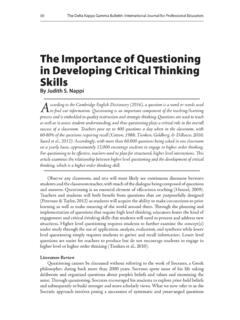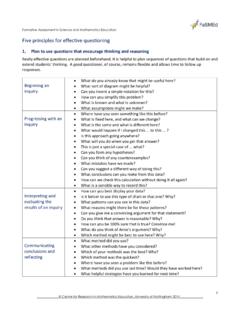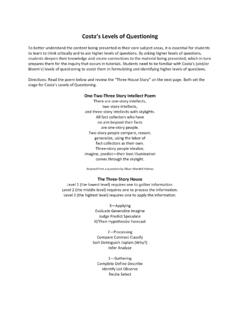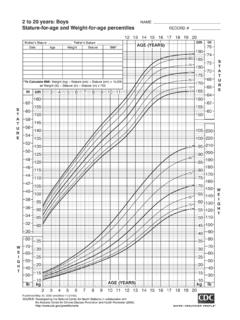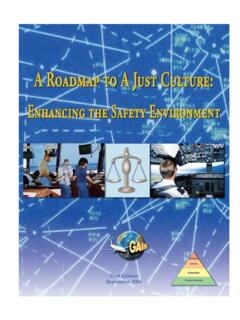Transcription of The Delta Kappa Gamma Bulletin
1 Generational Issues for EducatorsThe Delta Kappa Gamma BulletinInternational Journal for Professional Educators2017 Volume 84-12 The Delta Kappa Gamma Bulletin : International Journal for Professional EducatorsThe Delta Kappa Gamma BulletinThe Bulletin , an official publication of The Delta Kappa Gamma Society International, promotes professional and personal growth of members through publication of their writings. Three online issues per year, subtitled International Journal for Professional Educators, focus on research-based and documented works applied and data-based research, position papers, program descriptions, reviews of literature, and other articles on announced themes or other topics of interest to educators.
2 Two print issues, subtitled Collegial Exchange, focus on articles based on practice and experience related to education, the Society, women, and children, as well as personal reflections and creative works. All five issues include book and technology reviews, letters to the editor, poetry, and graphic arts. Submissions to the Bulletin , a refereed publication, are reviewed by the Editorial Board and the Society editorial staff. Selection is based on relevance of the topics addressed, accuracy and validity, contribution to the professional literature, originality, quality of writing, and adherence to Submission Guidelines (see page 63). Editorial Board members evaluate each submission s focus, organization, development, readability, and relevance to the general audience of Bulletin readers.
3 Due to the diversity of the Bulletin audience, material that expresses a gender, religious, political, or patriotic bias is not suitable for send materials to or to Bulletin Editorial Staff, The Delta Kappa Gamma Society International, Box 1589, Austin, TX Delta Kappa Gamma Society International, Box 1589, Austin, TX BoardThe Delta Kappa Gamma Bulletin (ISSN 0011-8044; USPS 715-850; IPM 0302295) is published five times each year by The Delta Kappa Gamma Society International, 416 West 12th Street, Austin, Texas. Mailing address: Box 1589, Austin, TX 78767-1589. Periodicals Postage paid at Austin, Texas. Periodicals Postage paid at Austin, Texas. Subscription, $31 per year; single copies, $7 each (journal) or $5 each (magazine).
4 International dues include subscription to The Delta Kappa Gamma Bulletin . Views expressed do not necessarily agree with positions taken by The Delta Kappa Gamma Society : Send address changes to The Delta Kappa Gamma Box 1589, Austin, TX 78767-1589 Judith Merz, EdD, Editor Doctoral Advisor, Educational LeadershipNova Southeastern UniversityFt. Lauderdale, FloridaKolbr n . P lsd ttir, PhD, 2016-2020 Assistant Professor, School of EducationUniversity of IcelandReykjavik, IcelandBarbara Perry-Sheldon, EdD, 2014-2018 Professor Emerita of Teacher Education, North Carolina Wesleyan CollegeRocky Mount, North CarolinaNora L. Pollard, PhD, 2014-2018 Senior Disability Policy ConsultantEducational Testing ServicePrinceton, NJMargaret Trybus, EdD, 2016-2020 Senior Associate Dean, College of Graduate StudiesProvost Concordia Dalian ChinaProfessor, Educational LeadershipConcordia UniversityChicago, Illinois3 Generational Issues for EducatorsThe Delta Kappa Gamma Society International promotes professional and personal growth of women educators and excellence in for Submissions.
5 4 From the Editor .. 5On the Theme: Generational Issues for Educators Food for Thought: Learning More about GenerationsBy Barbara Perry-Sheldon .. 6 Teaching Side by Side by Side: An Intergenerational Case StudyBy Kathleen Lozinak .. 11Of General Interest:The Impact of Teacher Efficacy and Beliefs on Writing InstructionBy Ginnie Curtis .. 17 Creating Schools that Emphasize Democracy and CitizenshipBy J na Benediktsdottir .. 25 The Importance of questioning in Developing Critical Thinking SkillsBy Judith S . Nappi .. 30 The Development of an Online, Graduate Practicum Course By Linda K . Lilienthal, Dennis Potthoff, and Kenneth E . Anderson ..42 Cool Tools for School: Twenty-First-Century Tools for Student EngagementBy Kyoko Johns, Jennifer Troncale, Christi Trucks, Christie Calhoun, and Michael Alvidrez.
6 53 Special Report:DKG Dues Adjustments: A StudyBy Phyllis A . Hickey, Nita Scott, Theresa Waller, Carolyn Pittman, Kara Hamann, and Judith R . Merz .. 59 Submission Guidelines .. 63 Submission Grid .. 642017 Volume 84-1 Published by the Delta Kappa Gamma Society International 2017 The Delta Kappa Gamma Society International. All rights Delta Kappa Gamma BulletinInternational Journal for Professional Educators4 The Delta Kappa Gamma Bulletin : International Journal for Professional EducatorsCall for SubmissionsMembers are encouraged to submit manuscripts for consideration by the Bulletin Editorial Board. The Delta Kappa Gamma Bulletin : Journal accepts research-based articles including Action/Classroom Research, Qualitative Research, Quantitative Research, Reviews of Literature, Program Descriptions, Position Papers, and Book/Technology Reviews.
7 The Delta Kappa Gamma Bulletin : Collegial Exchange accepts articles of a more practical, personal nature, including Classroom and DKG Practices/Programs, Viewpoints on Current Issues, Personal Reflections or Anecdotes, Inspirational Pieces, Biographies and Interviews, Book and Technology Reviews, and Creative should be focused, well organized, effectively developed, concise, and appropriate for Bulletin readers. The style should be direct, clear, readable, and free from gender, political, patriotic, or religious bias. For more detailed information, please refer to the Submission Guidelines on page 63 and the Submission Grids on page 64.
8 Listed below are the deadlines and, where appropriate, themes. Although there is a suggested theme for each issue of the Bulletin : Journal, manuscripts on all topics are welcome. The Bulletin : Collegial Exchange is not : Accountability (84-3; Online)(Postmark deadline is October 1, 2017)Professionalism Tenure National-State-Local Policies Student Learning School Improvement Collegial Exchange (84-4; Print)(Postmark deadline is December 15, 2017)No designated themeJournal: Disruptive Innovation (84-5; Online)(Postmark deadline is March 1, 2018)Change Collaborative Innovation Systemic Change Different Models of Leadership Challenge-driven Innovation Problem SolvingJournal: Schools and Societal Issues (85-1.)
9 Online)(Postmark deadline is May 15, 2018)Immigrants Refugees Poverty Bullying LGBT TransgenderSubmit all materials to: Bulletin Editorial Issues for EducatorsEducator, author, and businessman Stephen Covey once offered this provocative thought about perception: Each of us tends to think we see things as they are, that we are objective. But this is not the case. We see the world, not as it is, but as we are or, as we are conditioned to see it. When we open our mouths to describe what we see, we in effect describe ourselves, our perceptions, our paradigms (The Seven Habits of Highly Effective People, 2004, p. 28). Included in the conditioning that shapes one s perceptions that, in effect, shapes one s sense of self are factors associated with the era in which one comes of age.
10 The power of such generational identity and the relationships between and among generations have been the subject of literature ranging from Shakespeare s dramatic Romeo and Juliet to the humorous musical, Bye Bye Birdie; in both, the older generation essentially frets and muses about the younger Why can t they be like we were? and those in the younger generation, in turn, wonder why they must conform to the outdated ways of their elders. As educators, DKG members naturally interact with those in younger generations as well as with colleagues and community members who may represent still other age groups, each replete with its own experiences and perceptions.
